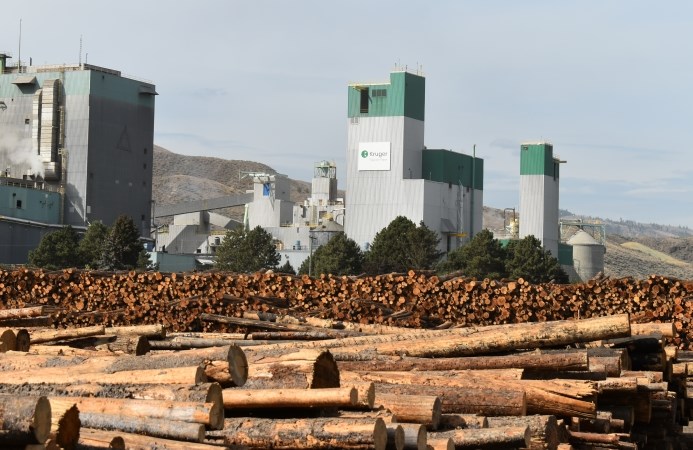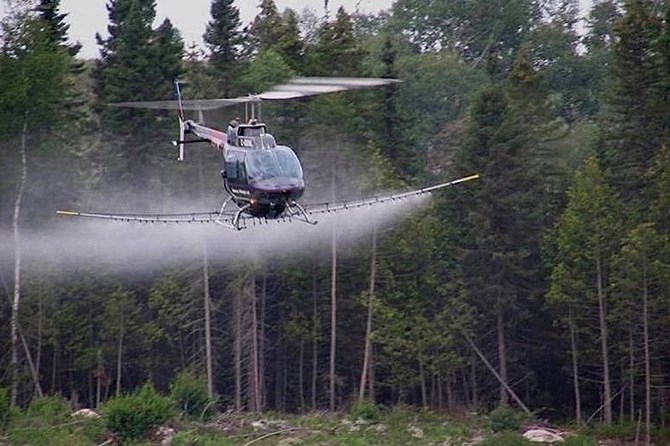
FILE PHOTO
(LEVI LANDRY / iNFOnews.ca)
January 22, 2024 - 7:30 AM
British Columbia’s use of glyphosate has drastically declined in recent years. Yet, the landscape of monoculture forests left after decades of chemical spraying could still spell a widespread ecological disaster for the province.
For decades, the forestry industry and province have used the chemical herbicide better known to consumers as ‘Round Up’, as a cheap way of wiping out competition and establishing uniform and profitable conifer forests.
This convenient, cost-effective chemical has been vehemently opposed by First Nations and other groups and its use has declined. However, the monoculture forests it produced are still being maintained by other means.
“Most people are surprised to find out we're still doing it. I remember mentioning it to a Swedish colleague and he said, ‘Oh my, we stopped that in the 1970s. I can't believe you're still doing that’,” UBC Professor of Forest and Conservation Sciences, Cindy Prescott, told iNFOnews.ca.
Prescott and her colleagues agree that it is far more “ecologically intelligent” to have diverse species that include non-conifers, for both the above and below-ground health of the forest.
“When you’re talking about below-ground diversity in the soil you’re talking about half of the diversity in the whole ecosystem, it’s all down there,” Prescott said. “We argue that it would be definitely worth considering that these plants could be collaborating in building a strong ecosystem, rather than just seeing them as competitors.”
In some areas of BC, the Ministry of Forests requires forest licensees to get rid of brush and shrub "competition" before it will take over in managing the forest, according to a report from the Ministry. As a result, forests void of diversity, wildlife and fertile soil span the province.
The Ministry of Forests declined an interview with iNFOnews.ca. In an email response, it said that rather than spraying glyphosate, more recently manual, mechanical and prescribed burning practices have been used for forest management.
However, this sole focus on the rapid regrowth of conifer crops is an outdated and problematic perspective, according to Prescott.
“I consider that 20th-century thinking and in the 21st century it just doesn't have a place. We need so much more from our forests now than just another crop of conifers,” she said.

Glyphosate herbicide is applied by helicopter spraying to a logged area after seedlings are replanted.
Image Credit: SUBMITTED / Doug Pitt, Natural Resources Canada
Fortunately, in recent years the has been a paradigm shift in the forestry sector, at least partly due to the work of Gary Merkel.
In April 2020 Merkel, a professional forester, natural resource expert and member of the Tahltan Nation, along with colleague Al Gorley, submitted 14 recommendations to the province for a new approach to forest management.
As a result of his recommendations, the province announced in September 2020 that it would be embarking on a new, holistic approach to protecting old-growth forests.
Through his work, Merkel found that as the old-growth, brush, understory, and harvested crops are cleared out of a forest and the remaining vegetation beneath the ground is left to rot and disappear, the forest's soil will gradually become sterile.
“Something actually has to feed the soil to build up its nutrients. Something has to take the nitrogen in the soil and turn it into nitrogen that a plant can use,” Merkel told iNFOnews.ca. “There are lots of plants, particularly trees, that can't take that out of soil. They need another plant to convert it into a form that they can actually use. So, (the soil) is an ecosystem unto itself.”
As a result, when a diverse range of plants are prevented from growing, the ecosystem will eventually become inhabitable to even the prioritised conifer crops.
“(The soil) starts to get much more sterile; it starts to get thinner, and the soil starts to compact from the bottom up,” Merkel said. “If you do this two or three times, you’ll end up with very, very shallow-rooted trees right across the landscape that will blow over very easily.”
In the wake of these practices, forests are becoming less resilient and less likely to recover from environmental impacts. And it doesn’t stop there. The animals living in the forest are also drastically decreasing.
“After you clear an area, you wipe out most of the underground ecosystem,” Merkel said. “All of your songbirds disappear. It takes, sometimes, 100 years for those to all come back. It takes 60 years for even a third of them to come back, and that's just one example.”
And even if many of the forests in British Columbia appear healthy from the outside, the reality can be quite the opposite.
“A forest is not an ecosystem, a forest is the product of an ecosystem,” Merkel said. “You can plant trees and they can look like a decent forest, but it may not be fully functioning and what we might characterize as a healthy ecosystem.”
However, Merkel is confident attitudes around forest management are making a change for the better.
“We have come to the realization that the only long-term stability that we are going to get is from maintaining healthy ecosystems and biodiversity associated with them."
To contact a reporter for this story, email Georgina Whitehouse or call 250-864-7494 or email the editor. You can also submit photos, videos or news tips to the newsroom and be entered to win a monthly prize draw.
We welcome your comments and opinions on our stories but play nice. We won't censor or delete comments unless they contain off-topic statements or links, unnecessary vulgarity, false facts, spam or obviously fake profiles. If you have any concerns about what you see in comments, email the editor in the link above. SUBSCRIBE to our awesome newsletter here.
News from © iNFOnews, 2024